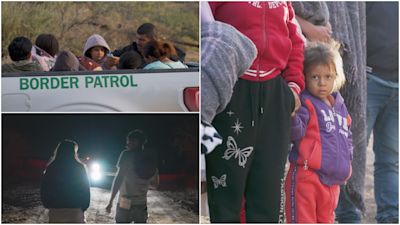At the Mexican border in Arizona, immigration is at the centre of the US election

ITV News' Sejal Karia is in Arizona where immigration is at the centre of voter's priorities in the upcoming election
It's six in the morning, and we're at the wall on the US-Mexican border, where America's divisions over immigration are laid bare.
In this election, the wall has reinforced the fundamental fault line separating blue from red America.
Today, we are accompanying Tim Doherty from Tuscon Samaritans as he looks for migrants to help.
The organisation has set up a makeshift aid camp with food and water near the point where migrants cross into the US along the border, by a partially-built wall that suddenly stops.
"As much ingenuity as you can put into putting a wall in is going to be countered by ingenuity to get through it", Doherty tells us.
He adds: "The woman with a kid is the last person who is going to want to up and trek through a desert and come to a wall and try to start up in a whole new place."
We've been driving along the wall for 45 minutes, when a border patrol car drives past us.
When we see them again, we watch as the officers are rounding up a group of migrants who crossed the border that morning. All were Mexican. About 20-25 were standing in a line, among them, families with young children.
They had surrendered themselves to Border Patrol agents and are seeking US asylum.
I speak to one woman who tells me she's been walking for days to reach the safety of the US, after fleeing the violent drugs cartels in Mexico.
"I lost my husband, a son and brother", she says. "We were in danger. I am now in a place where they can no longer hurt us."
She adds: "I don't want to return to Mexico. I want to stay here."
After a head count, she and the others in the group are loaded onto the back of two pickup trucks.
While handing out food and water, Doherty tells us, by the morning it's likely they'll have been bussed back to Mexico.
Most migrants are smuggled through by the Mexican drug cartels, Doherty says.
It's not just drugs like fentanyl they are bringing through the Arizona border. Human beings, he tells us, are now one of their most lucrative businesses.
Thirty miles from the Mexican border is the town of Tombstone - home of the infamous gunfight at the OK Corral. Jim Adams is the marshal here.
"More than half of all of the fentanyl, all of the fentanyl seized in the country was seized in Arizona because of a porous border - it's a money-maker for the cartels", he says.
It's not cowboys Adams is dealing with now, but drugs mules and people smugglers being run by Mexican cartels who rip through the town at high speed.
He tells us: "We have the high-speed pursuits and it's exceedingly dangerous, you know, they're going 80, 90 miles an hour, which is entirely too fast because it's a 35-mile-an-hour zone.
"But as soon as they hit the straightaway outside of town, it's 100, It's 120, it's 137 miles an hour and we'll chase them literally till the tires fall off."
"The wall, is a deterrent at this point, because it's incomplete, it's a deterrent for a portion that just pushes everything around a different way and until there's policy in place, this problem isn't going away."
In this battleground state of Arizona, immigration and border security are among the top issues.
If elected, Donald Trump is vowing to stage the largest deportation in US history and it's resonating with voters here in a way that Kamala Harris' promise of a crackdown on asylum simply isn't.
But every vote matters in Arizona, which is one of seven swing states that could decide this election.
So, an army of Democrat canvassers goes out everyday trying to convert rural Republican voters to turn blue.
Sue Doerfer who co-ordinates them tells us: "We have knocked on over 600,000 doors and made almost 200,000 phone calls since July".
She believes conversations move elections and her team find common ground with traditional red voters to try and persuade them to vote Democrat.
One of the main topics include the issue of reproductive rights, where Harris is polling strongly.
But Democrat campaigner Jorge Leon tells us it's not always proving easy.
"We've been able to get some people to support Kamala," he says.
"Has it been difficult?" I ask him.
"Very", he replies. "Because a lot of people, they're used to what they're used to."
Subscribe free to our weekly newsletter for exclusive and original coverage from ITV News. Direct to your inbox every Friday morning.
Steven Baker voted for Trump in 2020 and has voted early this time - again for Trump. He tells me he was not for being persuaded otherwise because he believes the former president is stronger on the issue that matters to him most - the economy.
"He seems, in my opinion, he seems more of a businessman," Steve says.
"You know, it was great four years ago, you know, it was $1.80 for gas and now I'm paying $3.70 or something like that, you know, just little things like that, it hurts the pocket."
But in this swing state where this race could be won or lost, it's the unfinished wall that's looming large. It is the centre of a political battle that could shape the outcome of this presidential election.
Want an expert briefing on US politics and the presidential race? Listen to our latest podcast Talking Politics USA